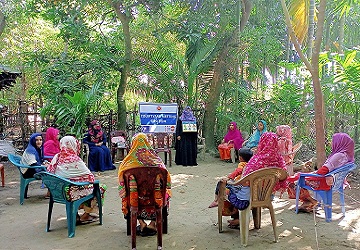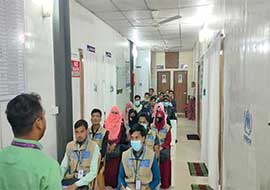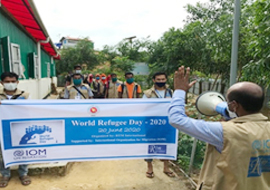Program Design and Implementation
RTM International designs and implements both short-term and long-term projects on health and education on being commissioned by esteemed clients. From 2005 to 2009, it worked as a partner implementing agency of the project on "Demand Based Reproductive Health commodity Project (DBRHCP) of the Government of Bangladesh and UNFPA. In this project, RTM International ensured improved capacity of reproductive health service provides to meet local reproductive health needs (in particular family planning needs) were appropriately through application of suitable BCC strategies resulting in position behavior change in targeted areas.
During 2003 - 2004 RTM International implemented a project of providing technical assistance to CONCERN Bangladesh in improving the quality of care and strengthening of partnerships among all members of the Municipal Health Committes of Saidpur and Parbatipur municipalities under its Child Survival Program.
(a) Programs for Myanmar Refugees
RTM International is implementing health programs for Myanmar Refugees in the UNHCR refugee camps at Teknaf and Ukhiyaupazillas of Cox’s Bazar. Over 30279 refugees are being given service. These programs are funded by UNHCR, UNFPA, WFP, UNAIDS and UNICEF. In this section, all activities conducted and services performed during the period January to December 2013 have been briefly described:
A sustainable approach to improve ESD services among Rohingya refugees living in camps at Taknaf and Ukhiya
• Prevention of Sexual and Gender based violence (SGBV): During the period (January – June, 2013) 1391 persons were counseled. Among them, 577 survivors, 204 perpetrators, 371 family members of the survivors, 201 family members of the perpetrators were counseled.
• HIV Program: Two-to -three group sessions were held in both the camps every week with female sex workers and peer educators. As many as 14008 participants attended the sessions. Among them, 1155 participants attended in weekly group session with high risk groups including relavant Peer Educators and 12853 participants attended in Field based daily basis group and one to one contact (General refugee, sex worker and their clients, drug user, mobile people including MSM). RTI/ STI treatment were provided by trained Doctors and Medical Assistants following the National Guidelines of Syndromic Management of RTI/STI. A total of 762 STI cases were treated; among them 225 partners were treated. In short 39.85% partners received treatment. The HIV program has been handed over to MoH on 30 June, 2013
• In-patient department (IPD) program: Towards ensuring safe motherhood services, RTM International runs the birthing units in each camp, one in Nayapara and the other in Kutupalang. During the period January - December 2013, 90.81% deliveries were handled in the facilities by the skilled attendants in both the camps.
• Community Based Network: Fourteen trained CTBAs are working with the outreach team and help in early referral of the delivery cases, sick children, cases of ANC, PNC etc. With the active involvement of outreach team, referrals for delivery in the IPDs have increased. Awareness raising sessions on Maternal Health, Safe Motherhood, Neonatal Health, Family Planning/ ECP, Breast Feeding are conducted by the CTBAs in both the camps. They also hold orientation meetings for newlywed couples in each camp.
• FP Performance: From January to December, 2013 Contraceptive Acceptance Rate (CAR) averaged 65.22%. In this period, total eligible couples in both the camps were 4452, out of them 2866 couples were receiving FP methods (864 women were under cover of oral pill, 267 males were using condom, 1210 under Injectable, 115 under Implant, 3 under IUD, 211 under tubectomy and 257 under vasectomy). In July 2011 RTM International was awarded with certificate as the best performing NGO in Family Planning Services in Cox’s Bazar District. It was also awarded the best performing NGO in Family Planning Services in Teknaf and Ukhiya Upazila in the year of 2012.
• Basic Education Program (BEP) in Kutupalong and Nayapara camps for Rohingya Refugees
With the support of UNHCR and funding from UNICEF, RTM International implemented the Basic Education Program (BEP) in Kutupalong and Nayapara camps for Rohingya Refugees. The Project has been handed over to VERC-SAVE THE CHILDREN in the mid-year of 2012.
During 2003 - 2004 RTM International implemented a project of providing technical assistance to CONCERN Bangladesh in improving the quality of care and strengthening of partnerships among all members of the Municipal Health Committes of Saidpur and Parbatipur municipalities under its Child Survival Program.
(a) Programs for Myanmar Refugees
RTM International is implementing health programs for Myanmar Refugees in the UNHCR refugee camps at Teknaf and Ukhiyaupazillas of Cox’s Bazar. Over 30279 refugees are being given service. These programs are funded by UNHCR, UNFPA, WFP, UNAIDS and UNICEF. In this section, all activities conducted and services performed during the period January to December 2013 have been briefly described:
A sustainable approach to improve ESD services among Rohingya refugees living in camps at Taknaf and Ukhiya
• Prevention of Sexual and Gender based violence (SGBV): During the period (January – June, 2013) 1391 persons were counseled. Among them, 577 survivors, 204 perpetrators, 371 family members of the survivors, 201 family members of the perpetrators were counseled.
• HIV Program: Two-to -three group sessions were held in both the camps every week with female sex workers and peer educators. As many as 14008 participants attended the sessions. Among them, 1155 participants attended in weekly group session with high risk groups including relavant Peer Educators and 12853 participants attended in Field based daily basis group and one to one contact (General refugee, sex worker and their clients, drug user, mobile people including MSM). RTI/ STI treatment were provided by trained Doctors and Medical Assistants following the National Guidelines of Syndromic Management of RTI/STI. A total of 762 STI cases were treated; among them 225 partners were treated. In short 39.85% partners received treatment. The HIV program has been handed over to MoH on 30 June, 2013
• In-patient department (IPD) program: Towards ensuring safe motherhood services, RTM International runs the birthing units in each camp, one in Nayapara and the other in Kutupalang. During the period January - December 2013, 90.81% deliveries were handled in the facilities by the skilled attendants in both the camps.
• Community Based Network: Fourteen trained CTBAs are working with the outreach team and help in early referral of the delivery cases, sick children, cases of ANC, PNC etc. With the active involvement of outreach team, referrals for delivery in the IPDs have increased. Awareness raising sessions on Maternal Health, Safe Motherhood, Neonatal Health, Family Planning/ ECP, Breast Feeding are conducted by the CTBAs in both the camps. They also hold orientation meetings for newlywed couples in each camp.
• FP Performance: From January to December, 2013 Contraceptive Acceptance Rate (CAR) averaged 65.22%. In this period, total eligible couples in both the camps were 4452, out of them 2866 couples were receiving FP methods (864 women were under cover of oral pill, 267 males were using condom, 1210 under Injectable, 115 under Implant, 3 under IUD, 211 under tubectomy and 257 under vasectomy). In July 2011 RTM International was awarded with certificate as the best performing NGO in Family Planning Services in Cox’s Bazar District. It was also awarded the best performing NGO in Family Planning Services in Teknaf and Ukhiya Upazila in the year of 2012.
• Basic Education Program (BEP) in Kutupalong and Nayapara camps for Rohingya Refugees
With the support of UNHCR and funding from UNICEF, RTM International implemented the Basic Education Program (BEP) in Kutupalong and Nayapara camps for Rohingya Refugees. The Project has been handed over to VERC-SAVE THE CHILDREN in the mid-year of 2012.
b) Operations Research to Improve Quality of MR Services in Bangladesh (July2011- June 2014)
Client: IPPF-SAAF
RTM International in partnership with Bangladesh Women’s Health Coalition (BWHC) and Bangladesh Association for Prevention of Septic Abortion (BAPSA) is implementing the project "Operations Research to Improve the Quality of MR services on Bangladesh" in selected rural and urban areas of Dhaka and Sylhet divisions of Bangladesh. This project is funded by Safe Abortion Action Fund of the International Planned Parenthood Federation. The specific objectives are to assess the current level of quality of MR services, identify and experiment the interventions and assess the impact of interventions. The OR activities are broadly divided into three phases as pre-intervention phase, intervention phase and evaluation phase. This OR is designed in a public private partnership model to improve quality of MR services. There are 10 facilities for the intervention, 2 from partner NGOs, 4 from government, one from private and three from other NGOs, and equal number of control facilities. The duration of the project is three years (July 2011 to June 2014).
As a part of the project a baseline survey has been conducted to assess the baseline situation relating to the quality of MR services in the country. The sampling frame of the baseline study covers 42 public, private as well as NGO facilities that are providing MR services in all seven administrative divisions of the country. To share the study findings and to finalize the intervention areas a dissemination workshop was held with different stakeholders working for MR services in Bangladesh. At the end of the project an endline survey will be conducted to compare the findings with the baseline situation.
The list of Intervention facilities is given below:
| Division | Type of Facility | Name of the Facility |
| Dhaka | GOB | Goalando Upazila Health Complex (RHC) |
| | | Shaheed Wahabpur Union Health and Family Welfare Center (UH&FWC) |
| | NGO | Shimantik Clinic |
| | | PSKP Clinic |
| | Private | Ayesha Memorial Hospital |
| | PNGO | Bangladesh Association for Prevention of Septic Abortion (BAPSA) Clinic |
| Sylhet | GOB | Balaganj UHC |
| | Tajpur UH&FWC | |
| | PNGO | BWHC Clinic - Zokiganj |
| | NGO | Shimantik Clinic |
The major areas of intervention:
• Training and refresher trainings to all MR Service providers of the intervention facilities will be provided during the intervention period.
• Routine technical assistance is provided by the quality improvement specialists including on-the-job mentoring.
• Different checklists have been developed for monitoring the quality of MR services.
• A counseling manual has been developed on MR services.
• BCC materials on MR services has been developed and distributed.
• Ensuring the use of the manual and BCC materials for counseling is a part of intervention.
• Two Field Research Assistants are responsible for ensuring proper documentation and record keeping on important service delivery performance indicators in the intervention areas.
• Knowledge sharing workshops and refresher training organized involving the intervening facilities.
• Four thematic bulletins were published.
• Improvement of the supply of logistics and equipment is necessary for some intervention facilities. On the need basis logistics are provided to the intervention facilities.
c) Towards sustainable quality healthcare delivery at grassroots level (TARSAN-CSO)
Client: European Union
TARSAN-CSO project is jointly implemented by Swisscontact and RTM International. The aim of the project is to ensure MCH and safe motherhood services in underserved and unreachable areas through developing health workforce from the same community. It is being implemented in Sunamganj, Patuakhali and Nilphamari districts. The project works with 2 CSOs per project area for implementing awareness programs in the project areas and 13 training institutions for providing training to Community Paramedics (CPs).
(i) Building awareness in the community: With the help of 6 CSOs and local media the project is building awareness on primary health, hygiene, MCH, FP and other RH issues. All 6 CSOs have wide spread activities in the project locations and through their community mobilizer and field staff they are staging dramas, utan-boitak and other community involving campaigns to make them aware of different health concerns and with their support select students from the community who could later serve their own community.
(ii) Capacity Building of CSOs and Community Paramedic Training Institutions (CPTI): The capacity gaps of CSO in undertaking interventions in project locations were identified through a systematic process of POCAT assessment. Based on the findings and recommendations, all 6 CSO capacities in areas of institutional and organizational development, governance, organizational sustainability and IT are being provided. Similar assessment was carried out with 13 CPTI who are providing training students in 2-year Community Paramedics course. Both technical training and training the CPs to become entrepreneurs in the community are being implemented this quarter.
(iii) Increasing access and utilization of services and system strengthening: In the current year, the first batch of CP students will be supported with financial support (linkage with banks and financial institutions) for starting their own service in the community; operational guidelines are being developed for their service charter; and referral systems will be strengthened with CP as the main entry point.
• Training and refresher trainings to all MR Service providers of the intervention facilities will be provided during the intervention period.
• Routine technical assistance is provided by the quality improvement specialists including on-the-job mentoring.
• Different checklists have been developed for monitoring the quality of MR services.
• A counseling manual has been developed on MR services.
• BCC materials on MR services has been developed and distributed.
• Ensuring the use of the manual and BCC materials for counseling is a part of intervention.
• Two Field Research Assistants are responsible for ensuring proper documentation and record keeping on important service delivery performance indicators in the intervention areas.
• Knowledge sharing workshops and refresher training organized involving the intervening facilities.
• Four thematic bulletins were published.
• Improvement of the supply of logistics and equipment is necessary for some intervention facilities. On the need basis logistics are provided to the intervention facilities.
c) Towards sustainable quality healthcare delivery at grassroots level (TARSAN-CSO)
Client: European Union
TARSAN-CSO project is jointly implemented by Swisscontact and RTM International. The aim of the project is to ensure MCH and safe motherhood services in underserved and unreachable areas through developing health workforce from the same community. It is being implemented in Sunamganj, Patuakhali and Nilphamari districts. The project works with 2 CSOs per project area for implementing awareness programs in the project areas and 13 training institutions for providing training to Community Paramedics (CPs).
(i) Building awareness in the community: With the help of 6 CSOs and local media the project is building awareness on primary health, hygiene, MCH, FP and other RH issues. All 6 CSOs have wide spread activities in the project locations and through their community mobilizer and field staff they are staging dramas, utan-boitak and other community involving campaigns to make them aware of different health concerns and with their support select students from the community who could later serve their own community.
(ii) Capacity Building of CSOs and Community Paramedic Training Institutions (CPTI): The capacity gaps of CSO in undertaking interventions in project locations were identified through a systematic process of POCAT assessment. Based on the findings and recommendations, all 6 CSO capacities in areas of institutional and organizational development, governance, organizational sustainability and IT are being provided. Similar assessment was carried out with 13 CPTI who are providing training students in 2-year Community Paramedics course. Both technical training and training the CPs to become entrepreneurs in the community are being implemented this quarter.
(iii) Increasing access and utilization of services and system strengthening: In the current year, the first batch of CP students will be supported with financial support (linkage with banks and financial institutions) for starting their own service in the community; operational guidelines are being developed for their service charter; and referral systems will be strengthened with CP as the main entry point.
-
Current Information
-
Activities Pictures
RTM International are implementing Health Support and research activities in the different Districts of Bangladesh which are funded by different Donors.
RTMI-UNFPA Project

Courtyard meeting organized by RTMI-UNFPA
RTMI-UNHCR Project

CHW training on scabies prevention
RTMI-IOM Project

World Refugee Day - 2020
